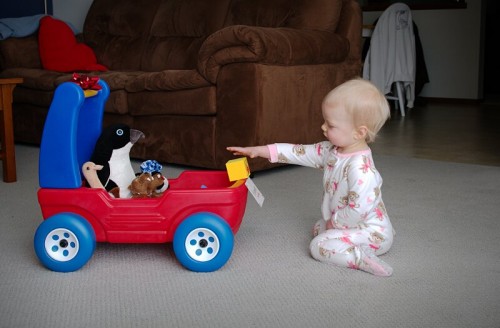In my reading and podcast listening I’ve come across lots of information about family finance. Sadly, one of the most common factors cited in divorce cases is arguments about money. APM’s Marketplace radio show often discusses how couples / families handle their finances and there are lots of ways to do it. Presumably, or hopefully, the end goal of any arrangement is to minimize arguments about money.
A lot of discussions revolve around merging finances when both partners earn an income. I think some of these methods are bad arrangements that fail at the main goal of minimize disagreements. For example: each person keeps their own money, but contributes into a joint account for joint expenses. This just seems like a obvious way to set up a power struggle within the relationship when one person makes a meaningful amount more than the other. That person has more disposable income than the other. And in some respects that’s “fair,” but it makes the marriage seem more like a roommate agreement.
We only have a single income. Some arrangements for single incomes are equally terrible to the above dual-income arrangement. I’ve seen some suggestions where the income earner pays the bills and then gives the non-earner an allowance. This seems terribly patronizing and unequal. Both this and the above method cling to the idea that the money belongs to the earner which, in turn, sets up the scenario where the money is more important than the relationship.
We really like the solution we came up with when we got married, which would work just as well for dual-income families:
Mindset
First is the mindset. I go to work and the paycheck has my name on it; but it’s not my money. It’s our money. It belongs to the family and will be used for the family’s needs and wants first. (I think this is a major stumbling block for a lot of people.) By letting go of the ownership of the money you let go of the potential of feeling personally attacked when the money is spent on something about which you don’t care.
Second is the actual handling of the money. The paycheck itself is handled via direct deposit as follows:
Retirement Savings
My job offers 401K matching (up to a certain amount) so the first thing is to put enough money into retirement savings to fully utilize the free money being offered in the match.
Savings
Next we slice off as much as we want to put into general savings. This is where we’re accumulating a down-payment for a house. And this acts as an emergency fund for unexpected large expenses. Doing this first has a nice advantage which I’ll discuss below in “Everything Else.”
Personal Luxury
We each have personal checking accounts and we each get a little money each paycheck which is ours and ours alone. This is the best part of our arrangement. “Luxury” within the context of our personal versus joint expenses is kind of a fluid concept and open to interpretation. But it’s working well.
For example, when I came home the other day Jess was telling me about the candles she ordered from Yankee Candle. Since she was buying them with her luxury money I didn’t end up thinking “You spent how much money on candles?!” Likewise, when I wanted to buy an external flash for our camera, I just bought it with my luxury funds. No need to have a discussion with Jess about whether this was a good use of our money or whether we should do something else with it instead.
If our monthly expenses are running a little high, but one of us really wants to eat take-out then we can do that using luxury money. If there’s a luxury we both want, we can split the cost out of luxury funds.
I really like that when one of us gets excited about buying something, the other can be excited too instead of doing an internal calculation about what it’s going to cost.
Being able to spend a little money without worry or guilt is really freeing. It takes away much of the stress that builds in the tension between general frugality and occasionally just wanting a treat. We can be frugal with our general spending, but still buy things we want every so often.
The amount of money we give ourselves in this form changes over time. But it’s nice to have the discussion about what amount should be luxury spending only occasionally instead of rehashing it over every purchase.
Everything Else
At this point, everything left over goes into our general fund. This is the account we use for regular spending: groceries, rent, utilities, gas, car maintenance, student loans, etc. I like this part too. Since savings has already been taken care of, whatever is in this account can be spent. If we want to save more money, we take it off the top and adjust our monthly spending to match the change to this account.
—
All together this means there is no “budget.” I hate the idea of a budget. It’s tiring, stressful, and time-consuming. Instead, we just watch the status of the general fund and try to keep a consistent “burn rate.”
This approach works best once you’ve accumulated a cushion that allows you to absorb fluctuations (things were a bit more structured when we first got married and had absolutely no money and more bills). Fluctuations in spending are natural and one of the reasons I hate the idea of a budget. If, this week, we need to buy flour and sugar and there’s a sale on cereal (so we stock up) and we also need more chicken then it’s going to be a much higher bill than surrounding weeks. The burn-rate approach with a cushion handles this great–breaking a budget can cause stress and frustration even when you know it will balance out in the long run.
I think it does a really good job of truly minimizing potential arguments about money. There will still need to be discussions about how money is spent at a macro level (how much do we put in each bucket) and when making large purchases out of the savings account (house, car, appliances, etc.); but on a day-to-day level there really is no reason to disagree.






















